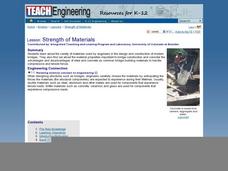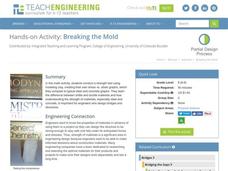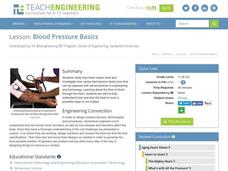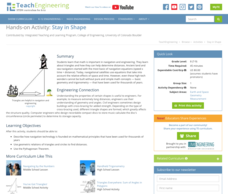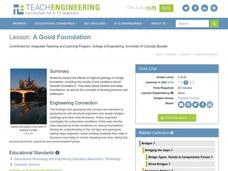Teach Engineering
Airplanes Everywhere: Land! Water! Sky! Oh, My!
How important is aviation? Using the background information, teachers provide the class with a brief history of aviation. The class discusses how airplanes are important to the area of transportation in the 17th installment of a...
Teach Engineering
Red Rover Robotics
Help your class understand the importance of exploration using robots. with a resource that provides a short history of robotics as a lead into looking at Martian robotic exploration missions. The activity specifically looks at the...
Teach Engineering
Strength of Materials
Pupils examine a stress-strain diagram that compares the advantages and disadvantages of the two common bridge building materials, concrete and steel. The also consider the factors that influence the materials builders choose for their...
Teach Engineering
Global Climate Change
The greenhouse effect and its relationship to global warming is the focus of an activity that asks class member to consider the effects of climate change on weather. Pupils work with their families to determine their carbon footprints...
Teach Engineering
Engineering Brainstorming
Here is a instructional activity that offers a great hybrid of forming new skills and using current knowledge to come up with a plan. The class brainstorms information they would need to know or already know about hybrid vehicles. They...
Teach Engineering
Breaking the Mold
A little too much strain could cause a lot of stress. Groups conduct a strength test on clay. Using books as weights, pupils measure the compression of clay columns and calculate the associated strain and stress. Teams record their data...
Teach Engineering
Electricity and Magnetic Fields
Introduce your class to the idea of magnetic fields around electrical wires with an activity that provides the information about the direction of a magnetic field around a wire carrying an electric current.
Teach Engineering
Solar Angles and Tracking Systems
The sun will continue to rise in the east and set in the west, no matter what. The first lesson in a series of eight introduces the class to solar angles. It makes connections between a person's latitude and the angle of position of the...
Teach Engineering
Blood Pressure Basics
Under pressure! The second lesson of the series introduces the class to blood pressure and the impact of high blood pressure on the cardiovascular system. It helps learners make the connection between blood pressure and how the heart...
Teach Engineering
Glue Sticks Bend and Twist
Stick this resource in the "Use" column. In the second installment of a six-part series, learners use glue sticks to demonstrate forces. Using glue sticks, instructors can demonstrate tension, compression, and torsion.
Teach Engineering
Air Pressure
Investigate what is pushing on us. An intriguing activity has pupils calculate the amount of force on various squares due to air pressure. Using the data, individuals create a graph in the third activity of the Up, Up and Away unit...
Teach Engineering
Windy Tunnel
Lift—it is about the wing's attack. Using a virtual wind tunnel, pupils investigate wing shape and angle of attack. Learners use worksheets to record their observations and to convert verbal relationships into mathematical equations in...
Teach Engineering
Circuits
Don't know how to make the initial connection on electric circuits? This lesson provides the background to present the introductory vocabulary to learning about electric circuits. It is organized in a meaningful progression with an...
Teach Engineering
Machines and Tools (Part 2)
Which pulley system will give us a whale of a good time? Teams compare the theoretical and actual mechanical advantages of different pulley systems. They then form a recommendation for how to move a whale from an aquarium back to the ocean.
Teach Engineering
Fun with Bernoulli
Reduce the pressure in the classroom. The second instructional activity in an Airplanes unit of 22 introduces the class to Bernoulli's Principle. Pupils demonstrate the principle by blowing between different objects causing a reduction...
Teach Engineering
May the Force Be With You: Drag
Do not let friction drag you down! The 11th segment in a series of 22 focuses on the fourth force acting upon an airplane—drag. Pupils learn about the effects and causes of drag.
Teach Engineering
May the Force Be With You: Lift
Get the class up and going with a lesson that discusses how airplane wings provide lift. Pupils use their knowledge of Bernoulli's Principle to develop an explanation of how it creates lift on airplane wings.
Teach Engineering
Stay in Shape
Using their knowledge of right triangles, pupils find out how far a ship is from a light house. Class members determine how far around the world a ship would be sailing at a constant speed.
Teach Engineering
Stormy Skies
Young meteorologists examine the four main types of weather fronts and how they appear on a weather map. Participants learn about the difference between the types of weather fronts along with their distinguishing features. A...
Conneticut Department of Education
Personal Finance Project Resource Book
Balancing a budget, paying taxes, and buying a home may feel out of reach for your high schoolers, but in their adult years they will thank you for the early tips. A set of five lessons integrates applicable money math activities with...
Teach Engineering
Slinkies as Solenoids
What does an MRI machine have to do with a slinky? This activity challenges learners to run a current through a slinky and use a magnetic field sensor to measure the magnetic field. Groups then change the length of the slinky to see the...
Teach Engineering
A Good Foundation
It takes a strong foundation to build a house and a stronger one for a bridge. This resource presents the effects of geology and soil on bridge foundations. Working in groups, the class investigates the interaction of shallow and deep...
Teach Engineering
Measuring Viscosity
Groups use a marble to determine the viscosity of household fluids. The procedure calls for pupils to measure the amount of time it takes a marble to fall a specified distance in the fluids. Using unit conversions and algebra, the teams...
Teach Engineering
Magnetic or Not?
The class must determine the magnetic properties of different materials, including aluminum and steel by sorting through materials using a magnet. Groups make a prediction on whether a material is magnetic and then perform tests to...




